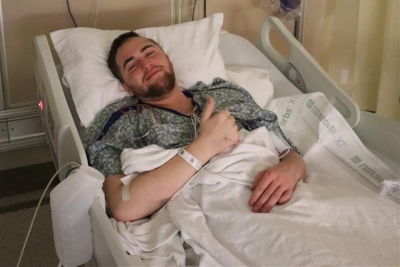Patient Story: Bradley Hamblin - Brain Tumor

Bradley Hamblin, a 24-year-old from Dennis, was having continuous headaches that by September of 2020, had turned into severe migraines. He also developed double vision and balance problems. Thinking it might be related to his eyeglass prescription, he made an appointment to see an optometrist. His eye exam revealed a swollen optic nerve that sent him to the emergency room for further evaluation.
“I went to the ER at North Mississippi Medical Center in Tupelo,” Bradley said. “They did a CT scan that showed a large mass, and so they ordered an MRI which indicated I had a brain tumor.” Following a malignant biopsy, Bradley was referred to the University of Mississippi Medical Center. His case was discussed at a collaborative tumor board conference where the team decided surgery was needed to remove as much of the tumor as possible, to be followed by systemic therapy. Bradley’s surgery was set for December with Dr. Omar Chohan, a neurosurgeon specializing in neuro-oncology, leading a multidisciplinary operative team.
Dr. Chohan elected to perform an awake craniotomy because of the tumor’s size and proximity to the eloquent areas of the brain, such as language, motor function and speech. “Dr. Chohan was very upfront and let me know that I could possibly be left debilitated,” Bradley explains. “It was not easy to swallow, but at the same time, it was a risk I had to take.” Dr. Chohan administered a drug called 5-ALA (Aminolevulinic Acid) about three hours prior to surgery. “Some tumors are very difficult to remove because the edges of the tumor can look like normal brain tissue,” Dr. Chohan explained. “5-ALA causes the tumor to fluoresce pink, making it easier to identify its boundaries and safely remove more mass without damaging healthy parts of the brain.”
During the five-hour surgery, Bradley was awake for about two hours as the neuropsychologist and the brain mapping team performed motor and speech testing to help Dr. Chohan preserve those abilities. “Bradley was asked to continuously speak and move his hand,” Chohan explained. “If the neuropsychologist noticed any weakness in the hand or skipping of words, he would let me know and that allowed me to stop when I needed to.” They were successful in removing a sizeable portion of the tumor while keeping all of Bradley’s abilities intact. “If you can remove a lot of the tumor safely, then you give the patient a lot of time,” Chohan said. “Chemotherapy and radiation then do a better job of treating and controlling malignant tumors.”
Bradley was released from the hospital after three days and later that month began a series of radiation treatments with chemotherapy. His headaches, double vision and imbalance greatly improved not long after returning home. “I feel great right now and my headaches have gone away for the most part,” says Bradley. “I’m very thankful to Dr. Chohan for giving me more time. I definitely appreciate my life a lot more than I did knowing it can be taken away just like that.”


